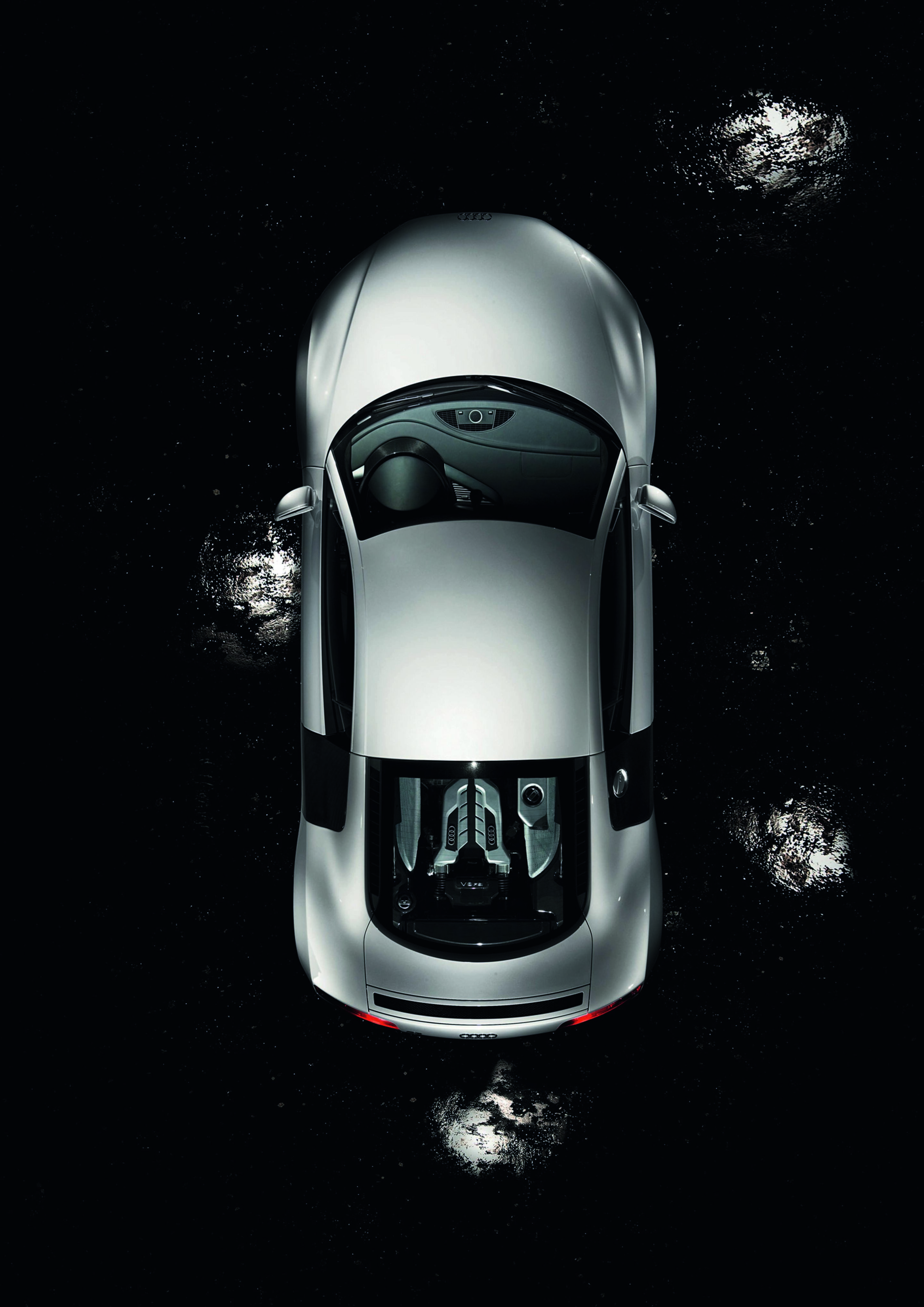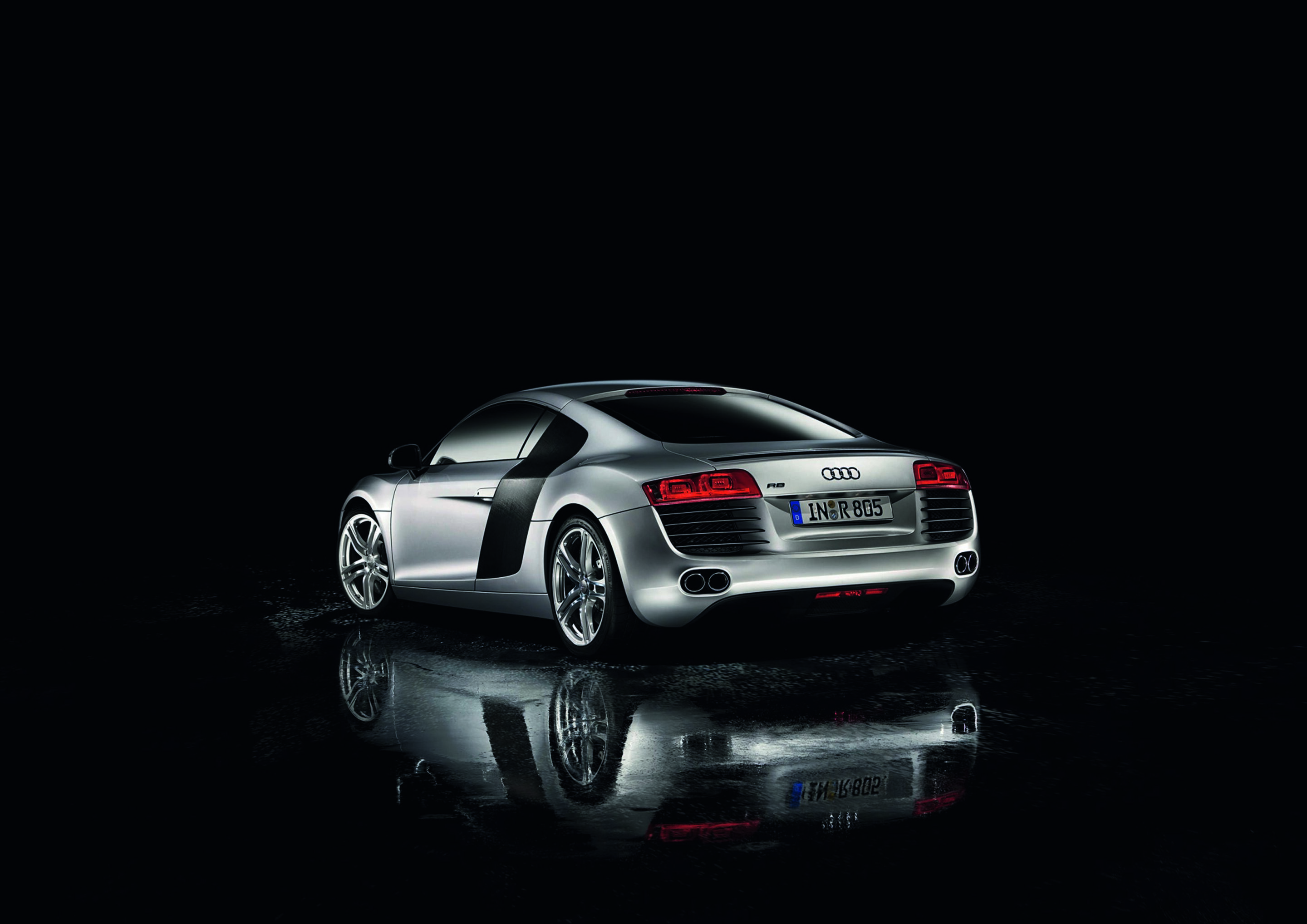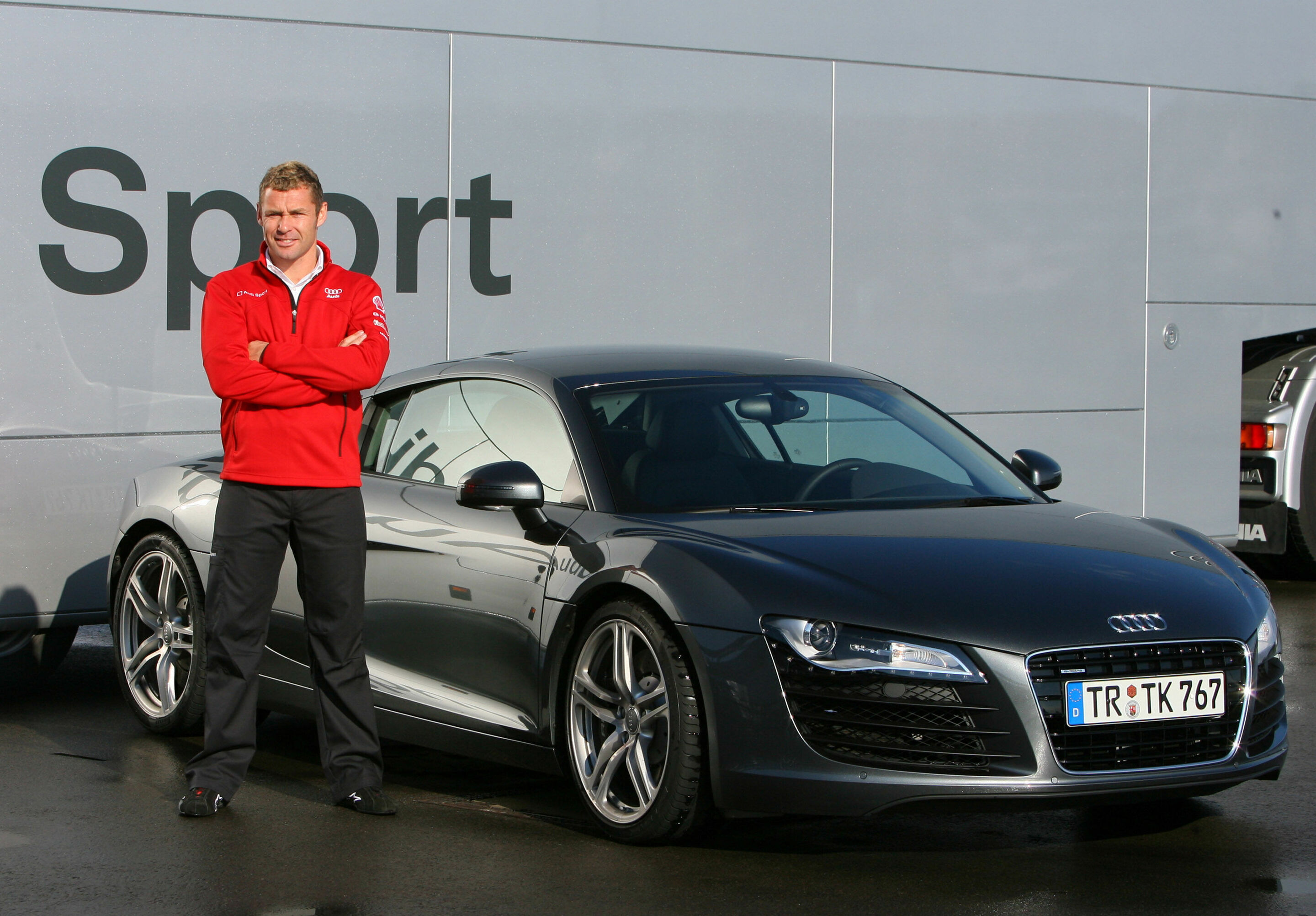Search
All search results for "2007 r8"
(216)
 Motorsport history
Motorsport history
In its second generation, the Audi R8 LMS was available in variants for the GT2, GT3 and GT4 categories. The Audi RS 3 LMS TCR touring car also existed in two generations for racing and competed on five continents. Since the start of the program, customers have won several hundred racing titles worldwide. Outstanding individual successes include two class victories for the GT3 sports car at the Daytona 24 Hours, three overall victories at the Bathurst 12 Hour, four triumphs in the road race in Macau and in the Spa 24 Hours and seven times at the Nürburgring 24 Hours. Photo: First overall victory at the Nürburgring 24 Hours in 2012
Pioneering performance with TDI technology
Audi demonstrated a pioneering achievement with TDI technology: the newly designed Audi R10 TDI was the first racing sports car with a diesel engine to triumph in the legendary Le Mans 24 Hours in 2006. In total, TDI technology prevailed eight times at Le Mans. Audi won again at the Sarthe in 2007 and 2008 with the R10 TDI. In addition, Audi won the American Le Mans Series three times in a row with the diesel racing car and also the European Le Mans Series in 2008. With the R15 TDI, Audi celebrated a one-two-three victory in the fastest Le Mans race of all time in 2010, setting a new distance record that still stands today. Audi TDI power also prevailed at Le Mans in 2011, 2012, 2013 and 2014. In 2014, the brand celebrated its 13th victory in just 16 participations. Audi also demonstrated “Vorsprung durch Technik” in terms of energy efficiency: throughout the TDI era, Audi reduced diesel consumption by 46 percent within a decade. Photo: Positions one, two, three and distance record for the Audi R15 TDI at the 2010 Le Mans 24 Hours
Title wins in the modern DTM
Following Laurent Aiello’s victory in 2002 with the Abt-Audi TT-R, Audi returned to the DTM in 2004 after a twelve-year absence and won the title at the first attempt with Mattias Ekström.
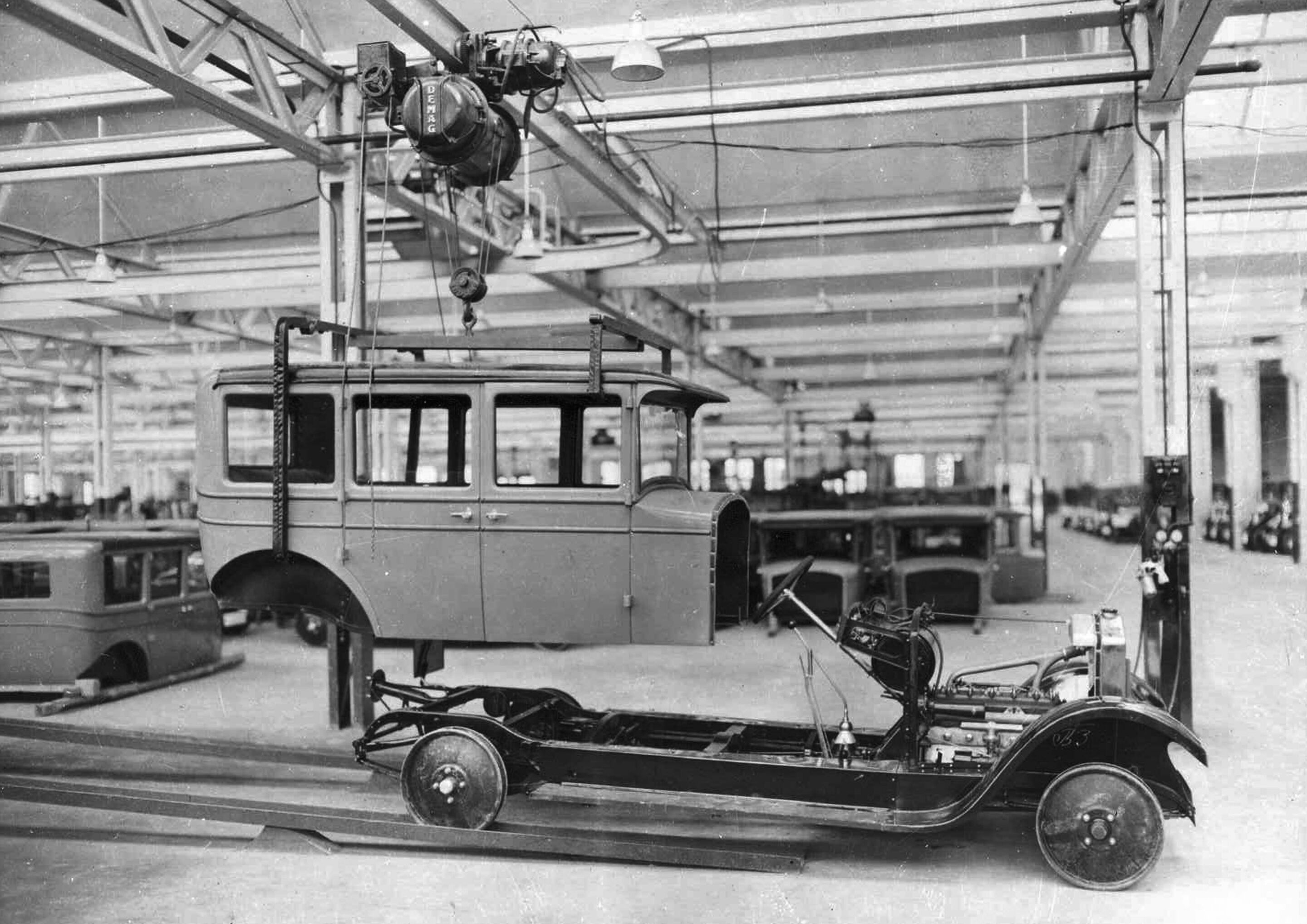 History
History
In the legendary “March on Heilbronn,” employees fight successfully to save the plant 1975 To better utilize production capacity, contract manufacturing of the Porsche 924 begins; the Porsche 944 follows shortly thereafter 1982 The Audi 100 achieves a world-record coefficient of drag (Cd) value of 0.30 1985 Introduction of the fully galvanized car body in the Audi 100 and Audi 200; company renamed AUDI AG and headquarters moved to Ingolstadt 1988 AUDI AG enters the full-size car class with the Audi V8 1989 Introduction of turbocharged diesel engine with direct fuel injection in a passenger vehicle 1990 First DTM victory for Audi with an Audi V8 quattro driven by Hans-Joachim Stuck 1994 Start of production of the Audi A8, the first series-produced vehicle in the world with a completely aluminum body (ASF – Audi Space Frame) 2000 Production of the Audi A2, the first aluminum, large-volume production car, begins 2001 Victory in Le Mans with the newly developed FSI direct fuel injection 2005 Audi Forum Neckarsulm opens 2006 German premiere of the Audi R8 sports car; first victory in the 24 Hours of Le Mans with a diesel engine developed in Neckarsulm 2007 Establishment of the production turntable between the Ingolstadt and Neckarsulm plants with the start of production of the Audi A4 Sedan 2008 Inauguration of the new Audi toolmaking shop 2011 Audi acquires a 23-hectare plot in the Böllinger Höfe industrial park in Heilbronn (further plots acquired in 2014 and 2018) 2012 Inauguration of the Technical Center for Fiber-Reinforced Polymers and the new Engine Test Center 2013 Audi Neckarsulm receives the J.D.
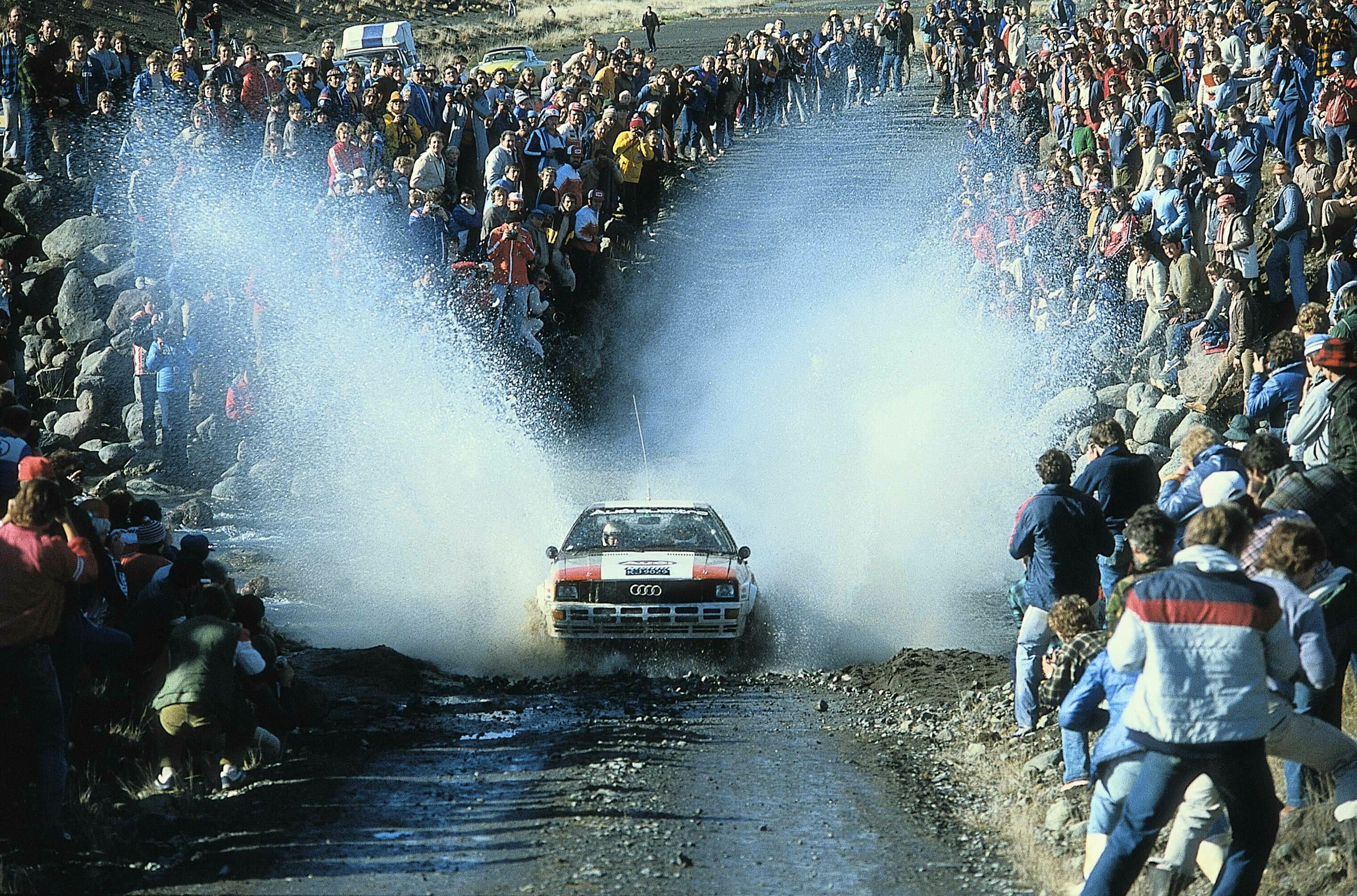 Successes spanning more than a century
Successes spanning more than a century
In its second generation, the Audi R8 LMS was available in variants for the GT2, GT3 and GT4 categories. The Audi RS 3 LMS TCR touring car also existed in two generations for racing and competed on five continents. Since the start of the program, customers have won several hundred racing titles worldwide. Outstanding individual successes include two class victories for the GT3 sports car at the Daytona 24 Hours, three overall victories at the Bathurst 12 Hour, four triumphs in the road race in Macau and in the Spa 24 Hours and seven times at the Nürburgring 24 Hours. Pioneering performance with TDI technology Audi demonstrated a pioneering achievement with TDI technology: the newly designed Audi R10 TDI was the first racing sports car with a diesel engine to triumph in the legendary Le Mans 24 Hours in 2006. In total, TDI technology prevailed eight times at Le Mans. Audi won again at the Sarthe in 2007 and 2008 with the R10 TDI. In addition, Audi won the American Le Mans Series three times in a row with the diesel racing car and also the European Le Mans Series in 2008. With the R15 TDI, Audi celebrated a one-two-three victory in the fastest Le Mans race of all time in 2010, setting a new distance record that still stands today. Audi TDI power also prevailed at Le Mans in 2011, 2012, 2013 and 2014. In 2014, the brand celebrated its 13th victory in just 16 participations. Audi also demonstrated “Vorsprung durch Technik” in terms of energy efficiency: throughout the TDI era, Audi reduced diesel consumption by 46 percent within a decade. Title wins in the modern DTM Following Laurent Aiello’s victory in 2002 with the Abt-Audi TT-R, Audi returned to the DTM in 2004 after a twelve-year absence and won the title at the first attempt with Mattias Ekström. The Swede also triumphed in 2007, followed by Timo Scheider in 2008 and 2009 – making Audi the first and so far only car manufacturer in DTM history to achieve a title hat-trick.
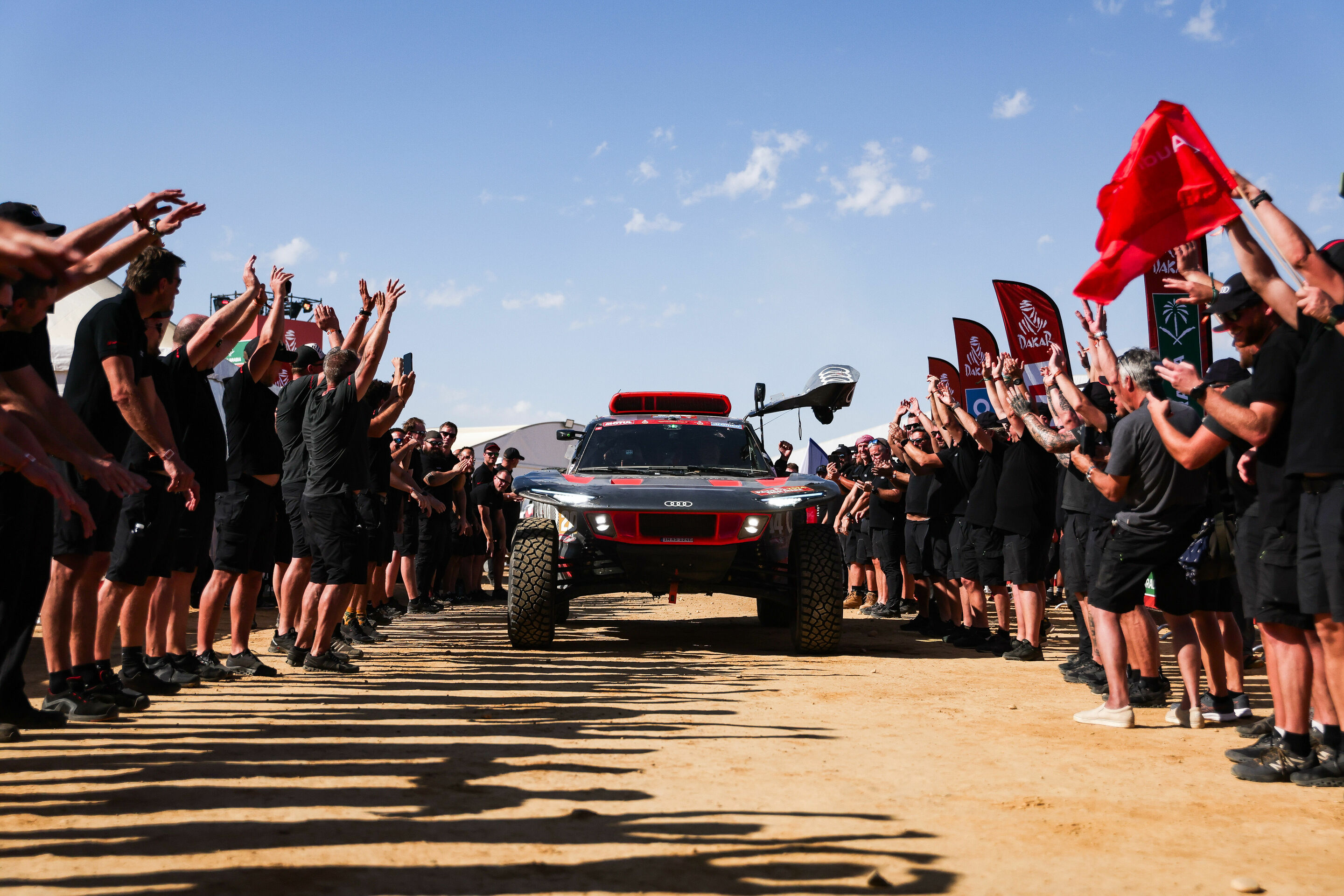 Audi’s most important motorsport successes
Audi’s most important motorsport successes
An overview of the most important successes from the factory teams and customer racing.
2024 Winner Dakar Rally (Audi RS Q e-tron) Winner Gulf 12 Hours (Audi R8 LMS GT3) Winner Dubai 24 Hours (Audi R8 LMS GT3) Winner Nürburgring 24 Hours (Audi R8 LMS GT3) Winner Belcar Endurance Championship TA Class (Audi RS 3 LMS) Winner British Endurance Championship (Audi R8 LMS GT3) Winner Coppa Italia Turismo (Audi RS 3 LMS) Winner Extreme Supercars Driven by Dunlop (Audi R8 LMS GT3) Winner FFSA GT4 France Pro-Am (Audi R8 LMS GT4) Winner GT America powered by AWS SRO3 Drivers (Audi R8 LMS GT3) Winner GT Sprint Challenge GT3 (Audi R8 LMS GT3) Winner GT Sprint Challenge GT4 (Audi R8 LMS GT4) Winner IMSA Michelin Pilot Challenge Drivers (Audi RS 3 LMS) Winner International GT Open (Audi R8 LMS GT3) Winner South Island Endurance Series 3 Hour (Audi R8 LMS GT3) Winner Sports Car Championship Canada presented by Michelin TCR (Audi RS 3 LMS) Winner TCR European Endurance (Audi RS 3 LMS) Winner TCR Italy (Audi RS 3 LMS) 2023 Winner Sepang 12 Hours (Audi R8 LMS GT3) Winner Mugello 12 Hours (Audi R8 LMS GT3) Winner Spa 12 Hours (Audi R8 LMS GT3) Winner Monza 12 Hours (Audi R8 LMS GT3) Winner Thunderhill 25 Hours (Audi R8 LMS GT3) Winner 24H Series European Championship GT3 Drivers (Audi R8 LMS GT3) Winner Belcar Endurance Championship (Audi R8 LMS GT2) Winner China Endurance Championship (Audi R8 LMS GT3) Winner Coppa Italia Turismo (Audi RS 3 LMS) Winner Coppa Italia Turismo Endurance (Audi RS 3 LMS) Winner Macau Guia Race (Audi RS 3 LMS) Winner North Island Endurance Series 3 Hour (Audi R8 LMS GT3) Winner Eset Cup Sprint (Audi R8 LMS GT3) Winner Eset Cup Endurance (Audi R8 LMS GT3) Winner GT America powered by AWS GT2 (Audi R8 LMS GT2) Winner GT2 European Series Pro-Am (Audi R8 LMS GT2) Winner GT4 European Series powered by Rafa Rafa Racing Club Pro-Am Drivers (Audi R8 LMS GT4) Winner GT60 powered by Pirelli (Audi R8 LMS GT3) Winner GTC Race GT3 Overall championship (Audi R8 LMS GT3)

The R8 was Audi’s first super sports car and the result of a cooperation with subsidiary Lamborghini A total of 45,949 units have left the Neckarsulm and Böllinger Höfe plants since 2007 The final particular model is a pinnacle: the R8 V10 GT RWD with rear-wheel drive
A super sports car legend takes its leave: In its 17 years, the Audi R8 has captured hearts and celebrated just as many successes. After 45,949 units produced, the final R8 rolled off the line at Böllinger Höfe in March 2024. A look back at an unparalleled success story.
Breathtaking design, a tantalizing engine sound, and driving dynamics like no other road-legal Audi ever offered: When it was unveiled in 2006, the R8 was a revolution – in Germany and around the world. A mid-engine super sports car; never before had Audi offered such a vehicle. With the R8, Audi moved into more exclusive segments previously dominated by brands such as Ferrari, Porsche, and Lamborghini. The Audi R8 was developed and built by the former quattro GmbH (today: Audi Sport GmbH). It immediately became the sporty icon in the company’s product portfolio and continues to contribute to the exclusive image of the Audi brand to this day. The R8 name refers to a successful race car that brought Audi more wins at Le Mans than any other manufacturer in history: In 1999, Audi launched its legendary Le Mans program with a sports prototype that started in the LMP900 class. The first name of this racing prototype was R8. It won at the 24 Hours of Le Mans in 2000, 2001, 2002, 2004, and 2005, making it the Le Mans sports car with the most victories in modern history. The prototype claimed more victories at the 12 Hours of Sebring, a race in the USA, which it won every year from 2000 to 2005. With these victories, Audi increased its prestige in international racing and laid the foundation for the road-legal R8 super sports car.
 Audi customers lead the standings in TCR Italy
Audi customers lead the standings in TCR Italy
Audi RS 3 LMS scores podium finishes in Italy Overall victory for the Audi R8 LMS GT2 in Spain Audi R8 LMS GT3 on the podium again in Italy
Customer racing successes were concentrated on southern Europe during the second weekend in July: Audi customer teams achieved podium results with the Audi RS 3 LMS at Mugello, Italy, and are leading four of the TCR Italy championship classifications. In the Campionato Italiano Gran Turismo Endurance at the same venue, an Audi R8 LMS also finished in the top three. The Audi R8 LMS GT2 celebrated an overall victory and second place in the Campeonato de España GT in Spain. The weekend was rounded off with a class win in Portugal for the GT4 version of the Audi R8 LMS.
Audi RS 3 LMS (TCR) Leading the standings in Italy: At the third round of TCR Italy at Mugello, customer teams with the Audi RS 3 LMS took podium places in all four races. Private driver Nicola Baldan from Aikoa Racing achieved second place in both heats of TCR Italy and twice won the Master class. With these strong results, the Italian moved up from seventh to first place in the overall TCR Italy drivers’ standings, while he also leads the Master class. With third place overall in the second race, Canadian Nicolas Taylor from PMA Motorsport also won the rookie classification and the classification for drivers under 25 years of age. He continues to lead the rookie standings. In the TCR Italy DSG for models from the Volkswagen Group with dual clutch transmissions, seven drivers relied on the previous generation of the Audi RS 3 LMS. Here, the Italian Luca Franca in the Audi RS 3 LMS from Aikoa Racing finished runner-up in the first race with a grid of 19 participants, ahead of his compatriot Luca Verdi, who won the class for drivers under 25. In the second race, Luca Franca was back on the podium with third place.
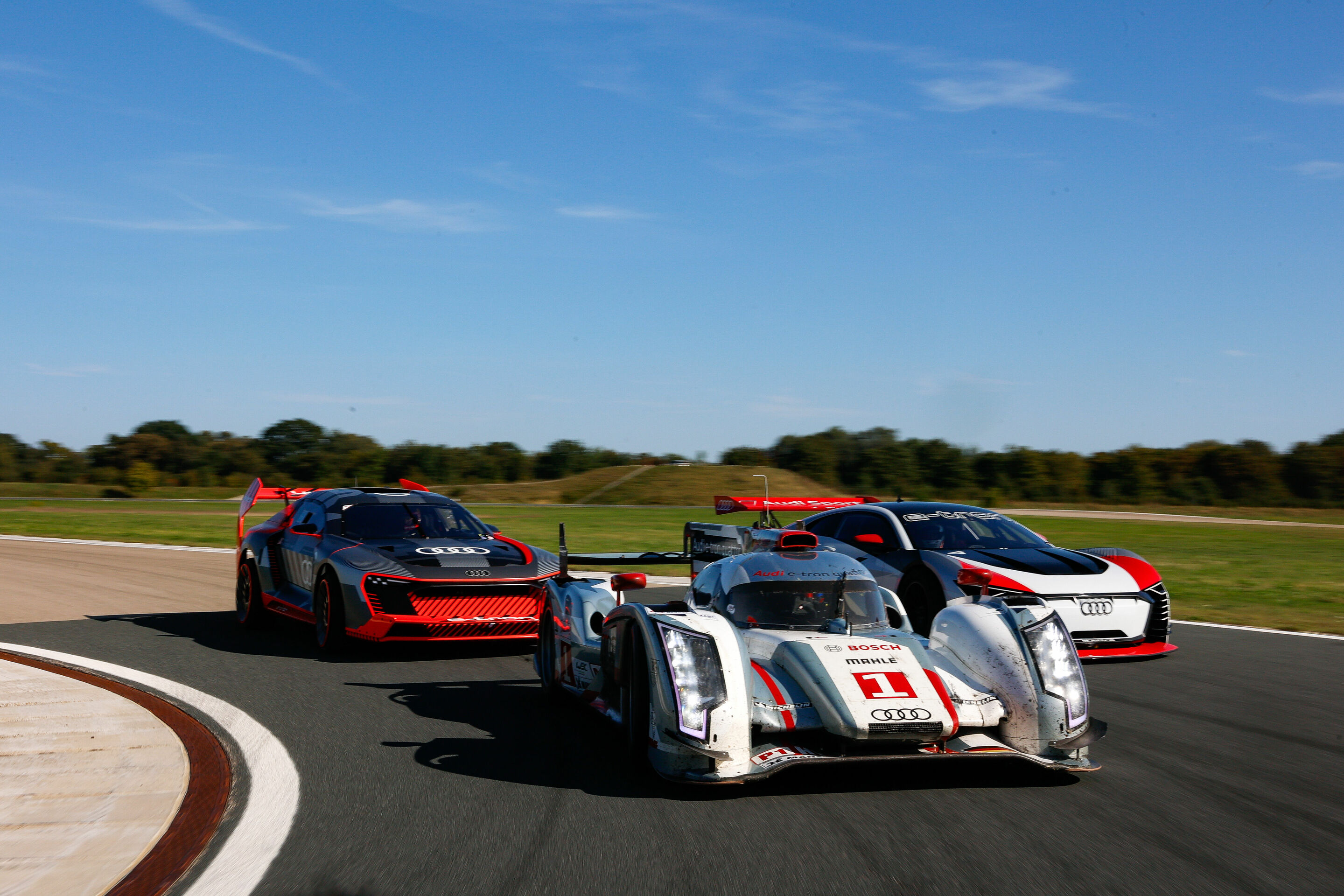 Audi motorsport history: From quattro to e-tron
Audi motorsport history: From quattro to e-tron
Audi R8 most successful Le Mans sports car in present-day racing After the dominant quattro drivetrain was banned from touring car racing, Audi switched to sports prototypes and also underpinned its slogan “Vorsprung durch Technik” in this motorsport category for 18 years. Audi, on making its debut at Le Mans in 1999, the toughest endurance race in the world, immediately managed the leap onto the podium, finishing third overall. In the following years, the Audi R8 was in a class of its own. From 2000 to 2002, Audi achieved a historic hat-trick, not least thanks to the TFSI technology that debuted in 2001 and then also subsequently made its way into production. In 2004 and 2005, customer teams clinched two further overall victories for Audi. The R8 secured its spot in motorsport history with a total of 63 victories in 80 sports car races. Title wins following the return to DTM Following Laurent Aiello’s victory with the Abt-Audi TT-R in 2002, Audi returned to the DTM with a factory-backed commitment in 2004 and instantly won the title with Mattias Ekström. In 2007, the Swede triumphed again, followed by Timo Scheider in 2008 and 2009, making Audi the first and so far only automobile manufacturer in DTM history to have managed a title hat-trick. In the 2011 season, Martin Tomczyk completed the success story of the Audi A4 DTM with another title, the fifth in total for the Audi A4 DTM. In 2013, Mike Rockenfeller, diving the Audi RS 5 DTM, clinched the ninth DTM title for Audi. René Rast caused a sensation in 2017 when he clinched another title for Audi in his rookie year. Audi took home the manufacturer’s championship crown in the same year. In 2019 and 2020, Rast won the prestigious title two more times. Audi drivers have thus already won the DTM drivers’ title twelve times. Added to this are six manufacturers’ and eight teams’ titles.
 Biography Mattias Ekström
Biography Mattias Ekström
Whether it was touring car racing in his home country where it all began, the DTM in Germany with the Class 1 touring cars, the Spa 24 Hours in the Audi R8 LMS, the World Rallycross Championship, the Race of Champions or electric racing on the circuit and off-road: within a very short space of time, the now 45-year-old Swede was one of the winners and soon also one of the championship contenders. At the Dakar Rally, he learned that mistakes are part of everyday life and that almost nobody gets through without setbacks. Ekström has experienced more than once in his still young career as a Dakar participant that a stage win can still come at the end of a subjectively unsatisfactory day. Accordingly, he knows how to adapt, minimize risks and also take a step back from time to time. Compared to the reproducible cycles in a circuit race, desert rallies contain countless surprises day after day. Mattias Ekström has learned to adapt to this. And he has another quality that is extremely valuable and that his team can rely on: The racing professional has proven more than once in his outstanding career that he is prepared to subordinate his own ambitions to the goals of a team if necessary.
